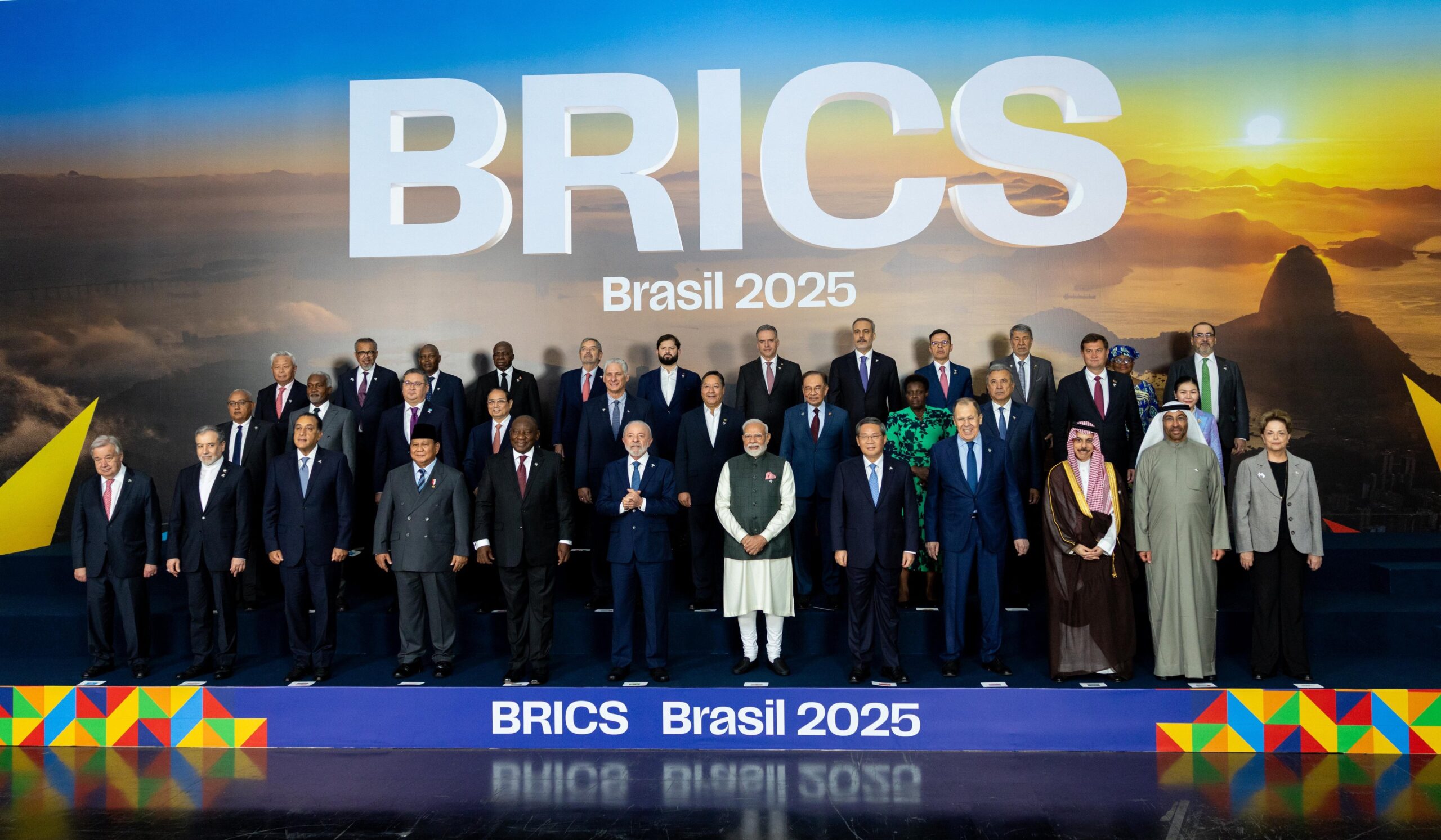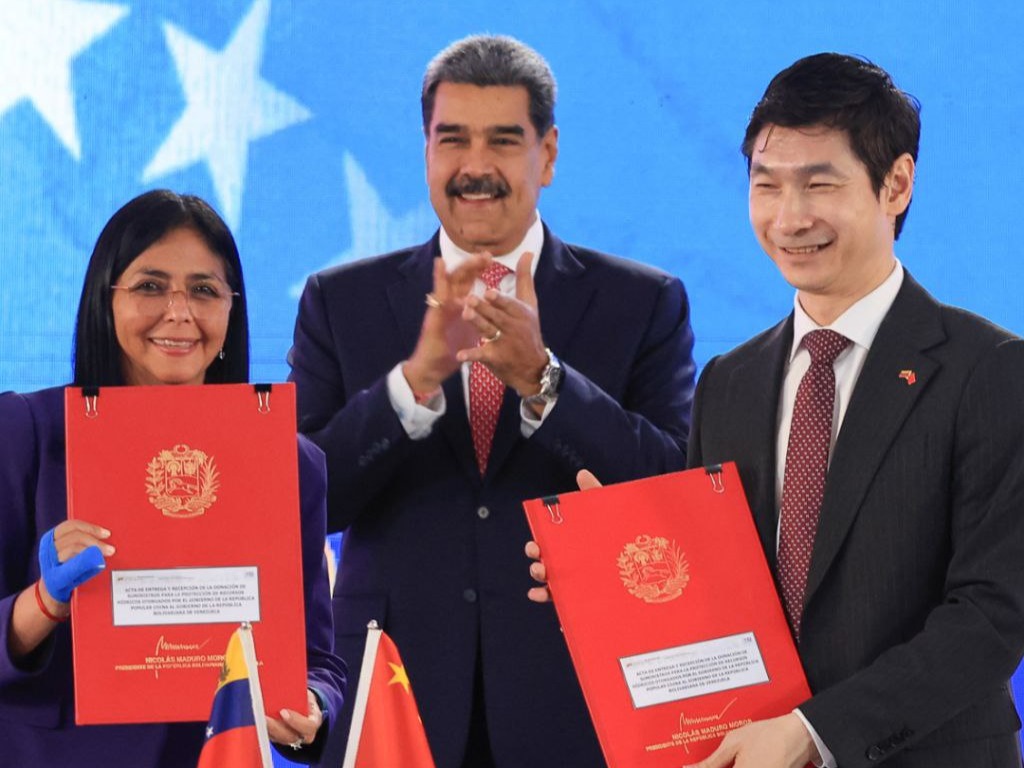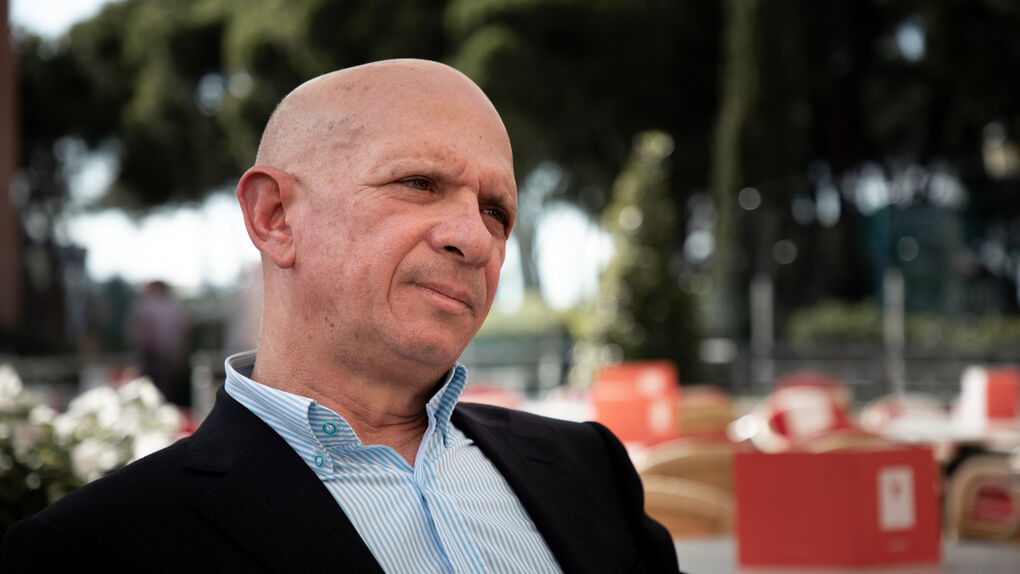Julio César Pineda, candidate of the Ecological Movement. Neil Villamizar, candidate of the Great Patriotic Pole. Héctor Milano, candidate of Cambiemos. Alexis Duarte Perroni, UNT and ÚNICA. Photographs: Candidates’ social media.
Guacamaya, April 22, 2025. The announced election for governor and deputies in the disputed territory of Essequibo, contested with Guyana but claimed by Venezuela, is another element in the conflict over a territory that is gaining increasing importance.
With candidates ranging from a Chavista admiral to a former ambassador, a sociologist, and a lawyer, the elections are taking place amid criticism and latent geopolitical tensions with Guyana, which has military alliances with the United Kingdom and the United States. The inclusion of eight deputies from Essequibo in Venezuela’s National Assembly (AN), controlled by the ruling party, adds more controversy to a process that could exacerbate the territorial dispute.
Oil operations by companies like ExxonMobil in disputed waters and incursions by the Venezuelan navy have created a tense climate involving global actors with major interests in the area, impacting Caribbean energy security.
How Did We Get Here?
In December 2023, the government of Nicolás Maduro, with partial support from opposition sectors including figures like Henrique Capriles and Governor Manuel Rosales, promoted a consultative referendum centered on Venezuela’s historic claim over the Essequibo territory, currently administered by Guyana. The referendum included five questions designed to strengthen the country’s diplomatic position: from rejecting the jurisdiction of the International Court of Justice in the territorial conflict to proposals such as the creation of a state called “Guayana Esequiba” and granting Venezuelan citizenship to its inhabitants.
This was the starting point for the creation of the Guayana Esequiba entity and the establishment of its status and authorities, which are now part of the electoral map for the May 25 elections. However, there have been questions and concerns about this territory and its role in the process.
Oil, Geopolitics, and Russia’s Shadow Amid U.S. Military Presence: The Global Threads of the Essequibo Conflict
Russia has described the Essequibo conflict as a “colonial legacy,” criticizing the military deployment of the United States and the United Kingdom in Guyana. This stance is not new, considering Moscow’s own past interests in the region. In 2019, the government of Nicolás Maduro modified an agreement to exempt Russian oil company Rosneft from taxes in the Patao and Mejillones gas fields, located in the Gulf of Paria near the maritime border with Trinidad and Tobago. The attempt, reported by Reuters, never materialized but revealed the importance of the energy alliance between Caracas and the Kremlin.
Although Rosneft left Venezuela in 2020 due to U.S. sanctions, it transferred its assets to a Russian state-owned company, ensuring the continuity of Moscow’s influence. According to Bloomberg, in 2019, the oil company considered entering Block 5 of the Deltana Platform, an area Venezuela claims as its own, bordering waters where ExxonMobil operates in the Stabroek Block megaproject. This block holds 11 billion barrels of crude oil and is at the heart of the dispute: Maduro considers it a “claimed zone” and has promised to defend it from “interventionists.” Additionally, he has moved forward with elections to integrate the territory into Venezuela’s geographical reality.
China on Both Shores
A few days ago, Huang Rui, Chargé d’Affaires of the Chinese Embassy, reaffirmed his country’s position on the border dispute between Guyana and Venezuela. Rui emphasized the importance of addressing the conflict through dialogue, aligning with the principles established in the 1966 Geneva Agreement, which urges the resolution of Venezuela’s historic claim over the Essequibo territory through political and peaceful negotiations.
“China’s position is clear and consistent: we trust that the governments of Guyana and Venezuela will find a solution through friendly consultations and direct negotiations,” the diplomat stated. This approach, he highlighted, supports international legal frameworks and reflects China’s commitment to regional stability and respect for diplomatic mechanisms.
The Geneva Agreement, signed over five decades ago, remains the key reference for resolving the dispute, recognizing the need for a consensual resolution between both nations without external interference. Rui’s statement reinforces the call to prioritize bilateral understanding over confrontation.
The Guyanese government rejected China’s declaration, accusing it of “interfering and siding with Venezuelan interests.”
The situation illustrates how several of the world’s major powers have shown interest in the region, which has become a significant geopolitical hotspot. Additionally, the interests of countries like Brazil, which see Essequibo as a direct gateway to the Caribbean—a crucial geopolitical objective—must be considered.
ExxonMobil vs. Venezuela: The Black Gold That Tightens the Rope
ExxonMobil’s presence in the Stabroek Block, backed by Guyana and protected by Washington, is a trigger for the crisis. Caracas insists that concessions to the U.S. multinational in waters adjacent to Essequibo are “illegal,” while Guyana, supported by Western powers, defends its “right” to exploit the resources.
The failed tax exemption for Rosneft, Moscow’s shadow over the Deltana Platform, the battle for the Stabroek Block, ExxonMobil’s presence, China’s statements, and Georgetown’s military cooperation with the UK and the U.S. expose how Essequibo is not just a territorial dispute but a battleground for global interests. At the center, Guyana emerges as a strategic pawn, with ExxonMobil and Washington shielding its rise as an oil power—described by the Financial Times as the “world’s last petrostate.”
Venezuela to Hold Regional Elections in Essequibo
Venezuela will hold regional elections in Essequibo, a 160,000 km² territory under de facto Guyanese administration but historically claimed by Caracas. The estimated population is 125,000, mostly Guyanese nationals. However, since December 2023, the government of Nicolás Maduro established an office of the SAIME (Venezuelan immigration authority) in Tumeremo, Bolívar state—the provisional headquarters of Venezuelan authority over Essequibo—to issue Venezuelan identity cards. The “provisional” capital of the disputed territory is located in this border town, where a Zona de Defensa Integral (ZODI), a military structure, also operates.
The eight deputies elected from Essequibo will increase the AN’s seats to 285, currently dominated by Chavismo with 277. The election mechanism for these legislators has not been specified, given that Venezuela does not exercise effective control over the area.
Under this context, three names present their options to become the first governor of the entity.
Profiles of the Gubernatorial Candidates
Neil Villamizar: “Great Patriotic Pole” Chavista Coalition
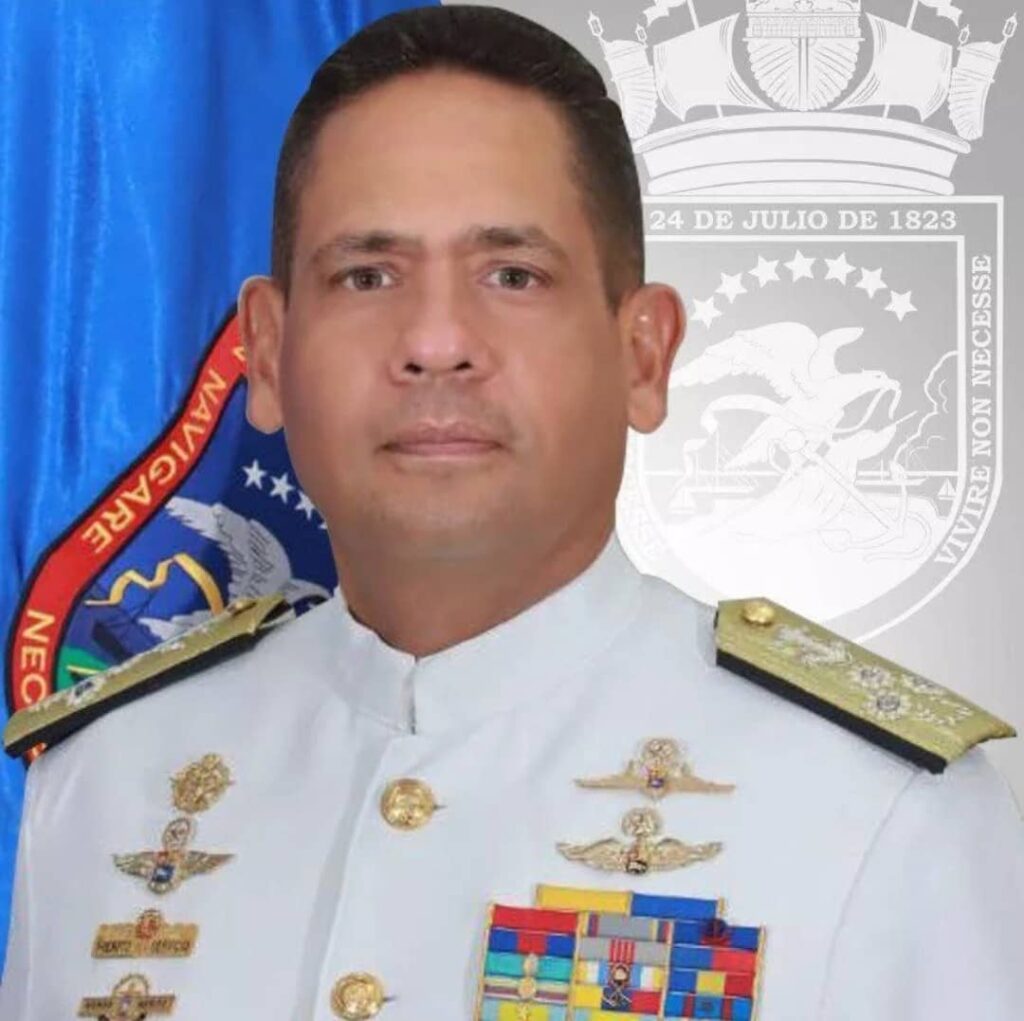
Neil Villamizar is an admiral in the Venezuelan Navy and the current “Head of Government of the State of Guayana Esequiba,” a position created by decree in 2023. Villamizar is the candidate of the Great Patriotic Pole, the ruling coalition.
His stance aligns with Maduro’s sovereigntist rhetoric, which in 2023 pushed a consultative referendum to reaffirm the territorial claim.
His military ties reinforce the strategic role of the Armed Forces in Venezuelan politics.
Julio César Bello Pineda: Ecological Movement

Julio César Pineda was Venezuela’s ambassador to the Soviet Union, South Korea, and the United Arab Emirates. This international analyst and university professor represents the Ecological Movement. A columnist and host of the program “Brújula Internacional” on Globovisión, Pineda seeks to capitalize on his technical profile in a scenario marked by uncertainty.
His candidacy relies on his extensive diplomatic career, offering an alternative approach to Venezuela’s territorial claim distinct from Chavismo.
His platform is sovereigntist, emphasizing dialogue while supporting the Venezuelan state’s historic position on the territory.
Héctor Milano: Cambiemos

Héctor Milano is a sociologist from the Central University of Venezuela and National Youth Secretary of Cambiemos. Milano is backed by the parties Acción Democrática (AD) and COPEI, whose leadership was previously subjected to judicial intervention. His candidacy positions itself as an alternative to the Great Patriotic Pole’s proposal. He also faces criticism from some opposition sectors, who accuse his party and alliances of being too close to the government—a claim they deny.
Milano has accused Venezuela’s traditional opposition of being under U.S. tutelage and has condemned the actions of ExxonMobil.
He has also proposed an educational policy focused on the indigenous communities in the area to promote their “professionalization,” including the establishment of a university specializing in geology or geophysics.
Alexis Duarte Perroni: UNT and ÚNICA
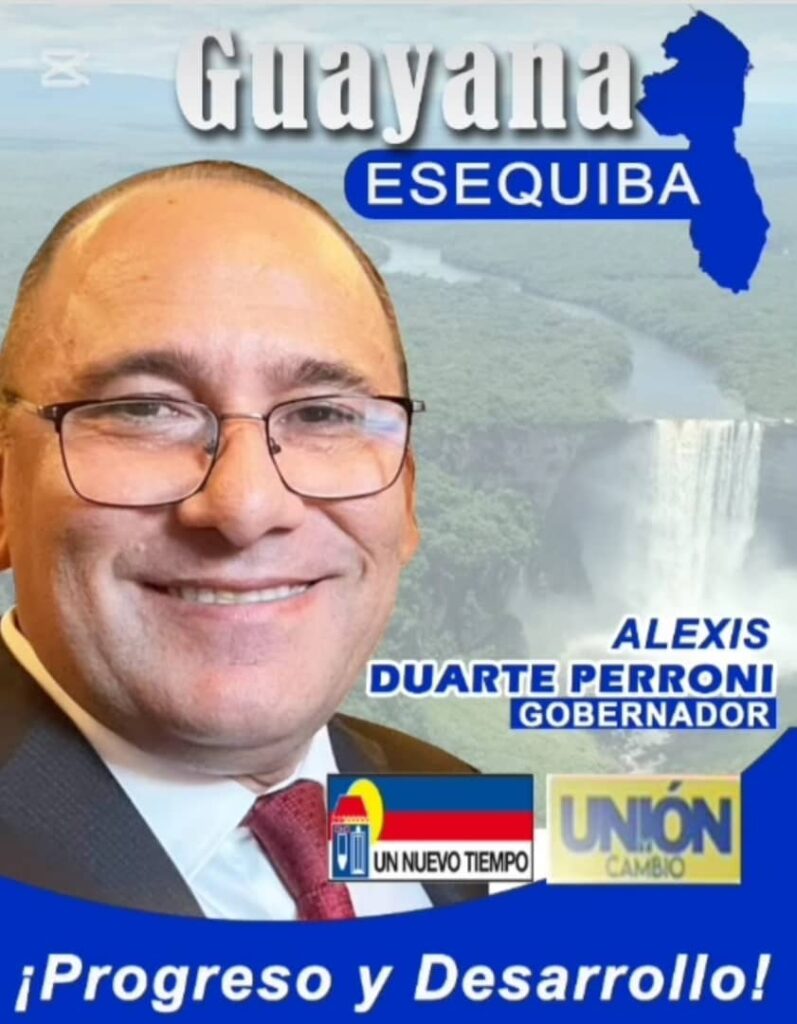
Alexis Duarte Perroni is a lawyer by profession and a candidate for UNT and Unión y Cambio (ÚNICA). He aspires to become the first governor of Guayana Esequiba. With a vision centered on sustainable development and innovation, he seeks to transform this strategic region south of Bolívar through projects combining economic growth, social inclusion, and the utilization of its geographic potential.
His most emblematic proposal is Regional Impact Industrialization.
In this regard, Duarte Perroni proposes the creation of the first diesel and gasoil motorcycle assembly plant in the area, a pioneering project designed to:
- Diversify local industry, leveraging the region’s tourist and commercial appeal.
- Generate direct and indirect employment, prioritizing local labor.
- Promote sustainable mobility with vehicles adapted to the territory’s transport and logistics needs.
The candidate has stated that the project will advance through negotiations with leading Japanese motorcycle manufacturers to establish technological and commercial agreements. Additionally, he proposes a “medium-term financing plan,” backed by the governorship, aimed at miners and small business owners to facilitate access to these units.
He has focused much of his discourse on social commitment, particularly toward indigenous communities.
Duarte Perroni expressed concern over the increase in indigenous migration to urban centers, especially among children aged 8 to 14, who leave their territories due to lack of basic resources.
To address this, he proposes:
- Subsistence and community development programs in indigenous zones.
- Child protection policies to ensure education, food, and security.
- Permanent dialogue with ancestral leaders to tackle structural causes of migration.
He has declared that his goal is to “build a prosperous Guayana Esequiba,” where industry and tourism complement each other, and “no citizen is left behind.” He has emphasized his commitment to a governance model prioritizing public-private alliances, productive innovation, and social justice.
With an agenda integrating economy, ecology, and equity, Alexis Duarte Perroni aims to position himself as a leader focused on making the region a benchmark for comprehensive development in Venezuela.
He will face logistical challenges in this election and uncertainty over electoral mechanisms for the area.
Consequences of the Election
The election of Venezuelan authorities in the region will have several consequences, the main one being that the conflict situation will deepen, increasing tensions with Guyana, which is backed by the United States and its allies—who have dismissed Venezuela’s legitimate claims.
A challenge will be developing a strategy for the Venezuelan state to exercise effective and sovereign control over the territory, ensuring the position does not become merely a symbolic gesture toward Venezuela’s historic and legitimate claim.
These elections do not just define local offices—they are a piece on the geopolitical chessboard for a territory rich in oil, natural resources, and potential as a key location for space exploration in the coming decades due to its proximity to the equator. The mix of candidacies reflects the complexity of a process where geopolitical interests and real sovereignty are disputed amid uncertainty and criticism. Questions persist about the election of these authorities, and the debate intensifies over a local election with geopolitical implications.


